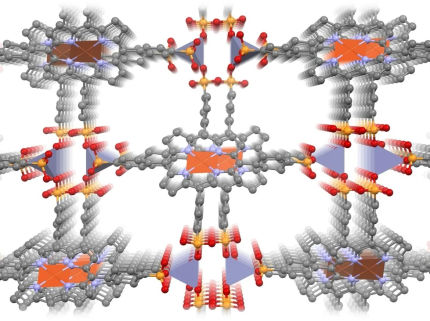Breakthrough in hydrogen research: More efficient isotope separation in sight
An international research team has taken a big step towards to realising its dream of separating hydrogen isotopes at room temperature at low cost
The lightest of all elements, hydrogen, is in great demand due to its promising role as a sustainable resource in the energy transition. A team from Leipzig University and TU Dresden, as part of the Hydrogen isotopes 1,2,3H Research Training Group, has made an important breakthrough in the efficient and cost-effective provision of isotopes. These are the three forms in which hydrogen occurs in nature – as protium, deuterium or tritium. The international team of researchers has taken a big step towards realising its dream of separating hydrogen isotopes at room temperature at low cost. The team’s findings have just been published in the journal Chemical Science.

Illustration of the preferential binding of heavy hydrogen (blue) to light hydrogen (white) at the metal centre, activated by the binding of a water molecule (oxygen red, hydrogen white).
Leipzig University
Protium, or hydrogen-1, is the most common form of hydrogen. Deuterium, known as heavy hydrogen, is playing an increasingly important role, for example in the development of more stable and effective pharmaceuticals. A mixture of deuterium and tritium, “super-heavy” hydrogen, serves as the fuel for nuclear fusion, a sustainable energy source of the future. One of the unsolved problems in hydrogen research is how to provide these isotopes in a highly pure form in an efficient and cost-effective way, as they have very similar physical properties. Current isotope separation processes are not very efficient and consume vast amounts of energy.
“It has been known for almost 15 years that porous metal-organic frameworks can, in principle, be used to purify and separate hydrogen isotopes. However, this has only been possible at very low temperatures, around minus 200 degrees Celsius – conditions that are very costly to implement on an industrial scale,” says Professor Knut Asmis from the Wilhelm Ostwald Institute for Physical and Theoretical Chemistry at Leipzig University and spokesperson for the Research Training Group. He adds that the separation mechanism is based on the strongly favoured adsorption of one of the isotopes present on one of the free metal centres in the porous solid. Adsorption is a process by which atoms, ions or molecules from a gas or liquid adhere to a solid, often porous, surface.
The doctoral researchers of the 1,2,3H Research Training Group Elvira Dongmo, Shabnam Haque and Florian Kreuter, who are all members of one of the research groups led by Professor Thomas Heine (TU Dresden), Professor Knut Asmis and Professor Ralf Tonner-Zech (both Leipzig University), have now gained a deeper insight into the influence of the framework environment on binding selectivity. This means the question of why one of the isotopes is more likely to stick than the other. This was deciphered in detail in the present study through a synergistic interplay between state-of-the-art spectroscopy, quantum chemical calculations and chemical binding analysis on a model system. “For the first time, we have been able to show the influence of the individual atoms of the framework compounds on adsorption. We can now optimise them in a targeted manner in order to obtain materials with high selectivity at room temperature,” says Heine.
The 1,2,3H Research Training Group, funded by the German Research Foundation (DFG) with 5.4 million euros over 4.5 years, has been training more than 20 doctoral researchers since October 2021. It combines the expertise of Leipzig University, TU Dresden, the Helmholtz-Zentrum Dresden-Rossendorf and the Leibniz Institute of Surface Engineering in order to develop novel materials, more effective drugs and more sensitive detection methods by bundling funding for basic research and training in the field of hydrogen isotopes. The second cohort of around 15 to 20 doctoral researchers will begin their three-year structured doctoral programme on 1 October 2024.
Original publication
Other news from the department science

Get the chemical industry in your inbox
By submitting this form you agree that LUMITOS AG will send you the newsletter(s) selected above by email. Your data will not be passed on to third parties. Your data will be stored and processed in accordance with our data protection regulations. LUMITOS may contact you by email for the purpose of advertising or market and opinion surveys. You can revoke your consent at any time without giving reasons to LUMITOS AG, Ernst-Augustin-Str. 2, 12489 Berlin, Germany or by e-mail at revoke@lumitos.com with effect for the future. In addition, each email contains a link to unsubscribe from the corresponding newsletter.




























































